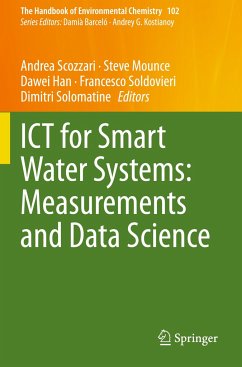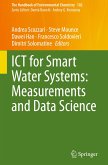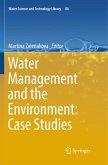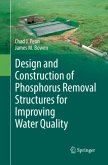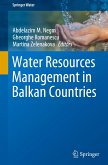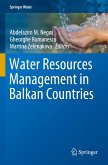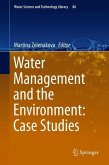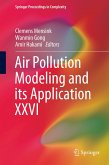ICT for Smart Water Systems: Measurements and Data Science
Herausgegeben:Scozzari, Andrea; Mounce, Steve; Han, Dawei; Soldovieri, Francesco; Solomatine, Dimitri
ICT for Smart Water Systems: Measurements and Data Science
Herausgegeben:Scozzari, Andrea; Mounce, Steve; Han, Dawei; Soldovieri, Francesco; Solomatine, Dimitri
- Broschiertes Buch
- Merkliste
- Auf die Merkliste
- Bewerten Bewerten
- Teilen
- Produkt teilen
- Produkterinnerung
- Produkterinnerung
Today, Information and Communication Technologies (ICT) have a pervasive presence in almost every aspect of the management of water. There is no question that the collection of big data from sensing and the insights gained by smart analytics can bring massive benefits. This book focuses on new perspectives for the monitoring, assessment and control of water systems, based on tools and concepts originating from the ICT sector. It presents a portrait of up-to-date sensing techniques for water, and introduces concepts and implications with the analysis of the acquired data. Particular attention…mehr
Andere Kunden interessierten sich auch für
![ICT for Smart Water Systems: Measurements and Data Science ICT for Smart Water Systems: Measurements and Data Science]() ICT for Smart Water Systems: Measurements and Data Science231,99 €
ICT for Smart Water Systems: Measurements and Data Science231,99 €![Water Management and the Environment: Case Studies Water Management and the Environment: Case Studies]() Water Management and the Environment: Case Studies93,99 €
Water Management and the Environment: Case Studies93,99 €![Design and Construction of Phosphorus Removal Structures for Improving Water Quality Design and Construction of Phosphorus Removal Structures for Improving Water Quality]() Chad J. PennDesign and Construction of Phosphorus Removal Structures for Improving Water Quality62,99 €
Chad J. PennDesign and Construction of Phosphorus Removal Structures for Improving Water Quality62,99 €![Water Resources Management in Balkan Countries Water Resources Management in Balkan Countries]() Water Resources Management in Balkan Countries77,99 €
Water Resources Management in Balkan Countries77,99 €![Water Resources Management in Balkan Countries Water Resources Management in Balkan Countries]() Water Resources Management in Balkan Countries77,99 €
Water Resources Management in Balkan Countries77,99 €![Water Management and the Environment: Case Studies Water Management and the Environment: Case Studies]() Water Management and the Environment: Case Studies90,99 €
Water Management and the Environment: Case Studies90,99 €![Air Pollution Modeling and its Application XXVI Air Pollution Modeling and its Application XXVI]() Air Pollution Modeling and its Application XXVI139,99 €
Air Pollution Modeling and its Application XXVI139,99 €-
-
-
Today, Information and Communication Technologies (ICT) have a pervasive presence in almost every aspect of the management of water. There is no question that the collection of big data from sensing and the insights gained by smart analytics can bring massive benefits. This book focuses on new perspectives for the monitoring, assessment and control of water systems, based on tools and concepts originating from the ICT sector. It presents a portrait of up-to-date sensing techniques for water, and introduces concepts and implications with the analysis of the acquired data. Particular attention is given to the advancements in developing novel devices and data processing approaches. The chapters guide the reader through multiple disciplinary contexts, without aiming to be exhaustive, but with the effort to present relevant topics in such a highly multi-disciplinary framework. This book will be of interest to advanced students, researchers and stakeholders at various levels.
Produktdetails
- Produktdetails
- The Handbook of Environmental Chemistry 102
- Verlag: Springer / Springer International Publishing / Springer, Berlin
- Artikelnr. des Verlages: 978-3-030-61975-6
- 1st ed. 2021
- Seitenzahl: 364
- Erscheinungstermin: 30. November 2021
- Englisch
- Abmessung: 235mm x 155mm x 20mm
- Gewicht: 552g
- ISBN-13: 9783030619756
- ISBN-10: 3030619753
- Artikelnr.: 62866274
- Herstellerkennzeichnung Die Herstellerinformationen sind derzeit nicht verfügbar.
- The Handbook of Environmental Chemistry 102
- Verlag: Springer / Springer International Publishing / Springer, Berlin
- Artikelnr. des Verlages: 978-3-030-61975-6
- 1st ed. 2021
- Seitenzahl: 364
- Erscheinungstermin: 30. November 2021
- Englisch
- Abmessung: 235mm x 155mm x 20mm
- Gewicht: 552g
- ISBN-13: 9783030619756
- ISBN-10: 3030619753
- Artikelnr.: 62866274
- Herstellerkennzeichnung Die Herstellerinformationen sind derzeit nicht verfügbar.
Dr. Andrea Scozzari, PhD in Information Engineering, is research scientist with the Italian National Research Council since 2002, after ten years of industrial experience. Formerly with the Institute of Geosciences and Earth Resources (CNR-IGG), now works with the Institute of Information Science and technologies (CNR-ISTI). His main research activities are in the field of data and signal processing for the observation of the environment. The most recent scientific interests regard: i) satellite radar altimetry and optical radiometry for the observation of inland and coastal water bodies; ii) data-driven modelling of groundwater flow and transport phenomena; iii) monitoring of critical sites and infrastructures at environmental risk. He's also been co-organiser and Committee member of various water-related events in the MENA region. Andrea holds a course in "Environmental remote sensing systems" at the University of Pisa (Italy) and has been member of the PhD board in "Remote Sensing" at the University of Pisa for six years. Dr. Steve Mounce is a Visiting Research Fellow in Hydroinformatics in the Civil Engineering Department at the University of Sheffield. His PhD is in Computer Science and he has over twenty years of experience on research projects with over 100 academic publications. His research combines Artificial Intelligence and Water Engineering for such applications as leakage (including smart meters), CSO analytics, water quality and burst event detection systems, fuzzy RTC, data mining and case based reasoning. He is still an active software developer and his Award winning Artificial Intelligence based automated analysis research software was commercialised as FlowSure by Servelec Technologies. Steve is the Director of the start-up Mounce HydroSmart Ltd. Dr. Dawei Han is professor of Hydroinformatics from Department of Civil Engineering, University of Bristol. His research interests include hydrological modelling, Real-time Flood Forecasting, Flood Risk Assessment and Management, Climate Change impact, Remote Sensing and Geographic Information System, natural hazards, etc. Dr. Francesco Soldovieri is a Research Director at Institute for Electromagnetic Sensing of the Environment of CNR. He was member of the Editorial Board of IEEE-GRSL and now of IEEE-TCI, IEEE-TGRS, Remote Sensing (MDPI) and Remote Sensing of Environment. He is Editor in Chief of HERITAGE, a MDPI journal devoted to Cultural and Natural Heritage. He has been the Scientific Coordinator of the FP7 projects ISTIMES and AMISS and the Technical manager of the H2020 Project HERACLES. He has been the President of the Division on Geosciences Instrumentation and Data Systems of European Geosciences Union. His research interests include radar imaging, data processing for GPR, indoor surveillance, through-wall imaging, passive radars, integration of geophysical data, radars for planetary exploration. He is the co-author of about 240 papers on national and international Journals and more than 350 conference proceedings. Dr. Dimitri Solomatine has PhD from the Institute for Systems Studies, Russian Academy of Sciences (1984). He has been with the IHE Delft Institute for Water Education (Delft, The Netherlands) since 1990, and since 2006 he holds the Hydroinformatics Chair. His research interests include hydroinformatics, integration of data and models, robust optimization, systems engineering, artificial intelligence, decision support, analysis of uncertainty and flood risk management. He participated in and led a number of workpackages of large-scale research projects, including the EU-funded TELEFLEUR, ELTRAMOS, FLOODsite, MyWater, KULTURisk, WeSenseIt. He was also a consultant and developer in several software development projects. He has published over 170 papers (110+ in peer-reviewed journals), chapters in books and conference proceedings and co-edited several special issues of journals. He is an associate editor of Journal of Hydroinformatics, and of the Hydrology and Earth System Sciences (HESS). He is the member of IWA, EGU and is the co-founder of the sub-division on Hydroinformatics of the European Geosciences Union.
Data science trends and opportunities for smart water utilities.- Review of Techniques for Optimal Placement of Pressure and Flow Sensors for Leak/Burst Detection and Localisation in Water Distribution Systems.- A bird's-eye view of data validation in the drinking water industry of The Netherlands.-Monitoring and controlling a smarter wastewater treatment system: a UK perspective.- Using Radial Basis Function for Water Quality Events Classification.- Promoting Smart Water Systems in Developing Countries through Innovation Partnerships: Evidence from VIA Water-supported projects in Africa.- Exploring assimilation of Crowdsourcing Observations into Flood Models.- Precipitation measurement with weather radar.- Satellite Remote Sensing of Soil Moisture for Hydrological Applications: A Review of Issues to Be Solved.- Spectroscopic Methods for Online Water Quality Monitoring.- Quartz-Crystal Microbalance sensors: new tools for the assessment of organic threats to the quality of water.
Data science trends and opportunities for smart water utilities.- Review of Techniques for Optimal Placement of Pressure and Flow Sensors for Leak/Burst Detection and Localisation in Water Distribution Systems.- A bird's-eye view of data validation in the drinking water industry of The Netherlands.-Monitoring and controlling a smarter wastewater treatment system: a UK perspective.- Using Radial Basis Function for Water Quality Events Classification.- Promoting Smart Water Systems in Developing Countries through Innovation Partnerships: Evidence from VIA Water-supported projects in Africa.- Exploring assimilation of Crowdsourcing Observations into Flood Models.- Precipitation measurement with weather radar.- Satellite Remote Sensing of Soil Moisture for Hydrological Applications: A Review of Issues to Be Solved.- Spectroscopic Methods for Online Water Quality Monitoring.- Quartz-Crystal Microbalance sensors: new tools for the assessment of organic threats to the quality of water.

